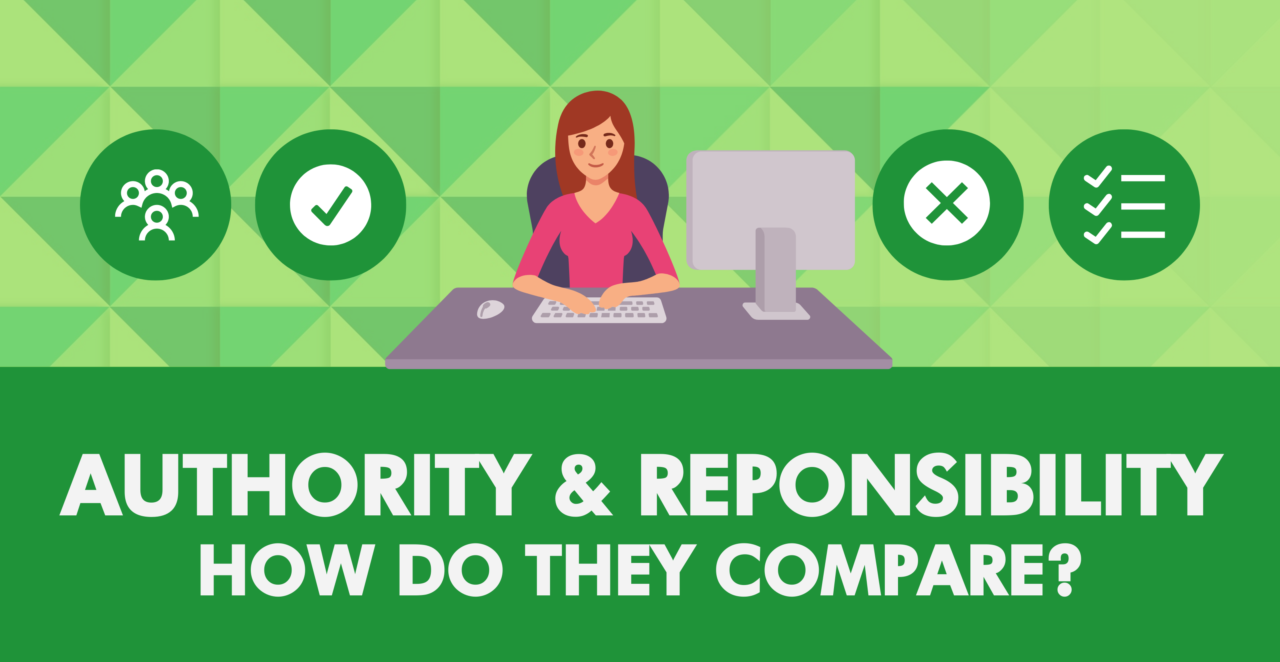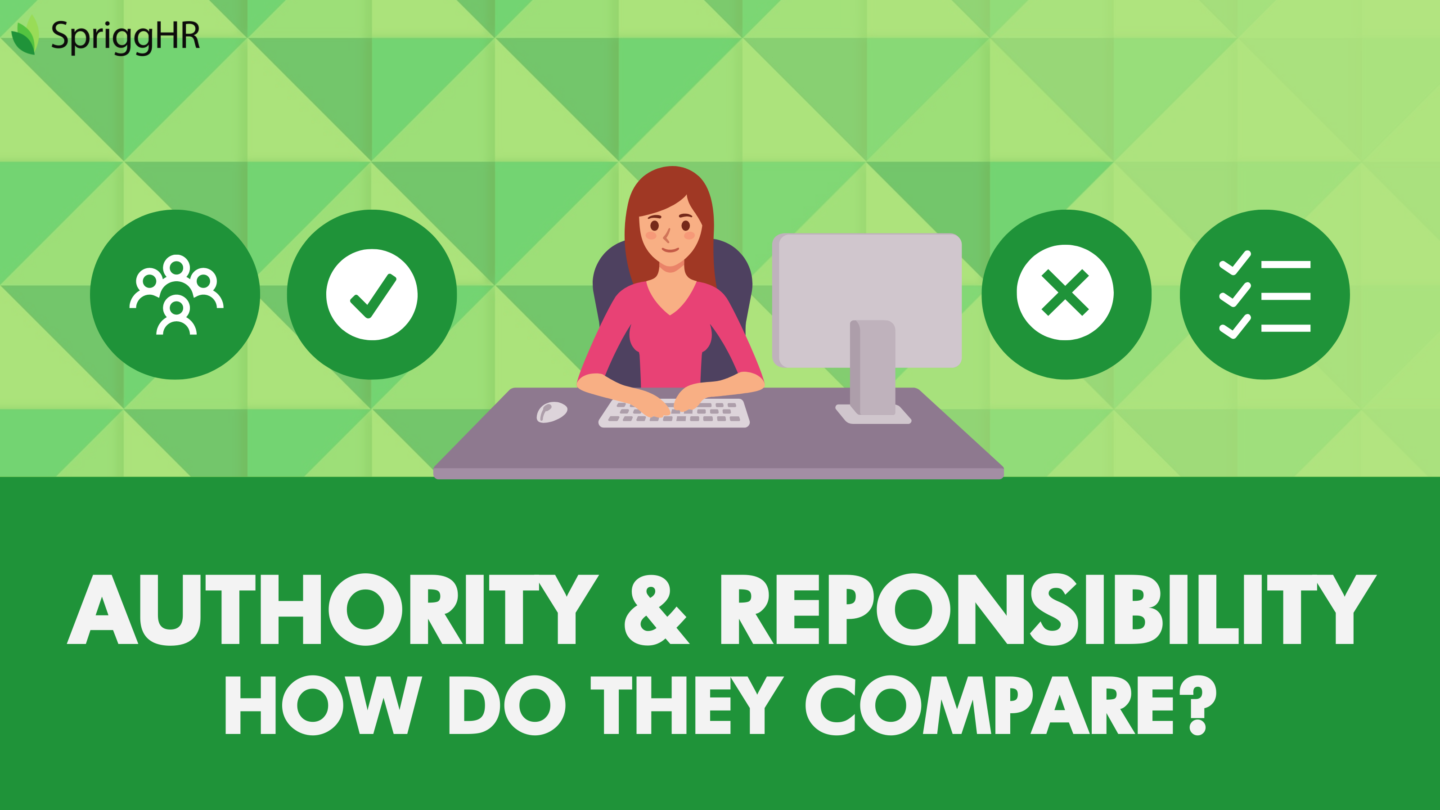
Authority and Responsibility – How Do They Compare?
In an organization, efficiently dividing work among people and coordinating their duties and tasks towards a common objective should always be a central goal. Managers and employees alike will find an extra layer of job security, and overall company success, if they have a thorough understanding of two essential work concepts: authority and responsibility. Success at work requires both of them, not just one.
In a hurry? Take the infographic to go!
Authority and Responsibility
Send download link to:
Authority and Responsibility: What Do They Mean?
What is Authority?
In simple terms, authority refers to the commanding of subordinates, the issuing of orders and instructions, and the process of exacting obedience from a workforce. While authority is defined as having the power to give orders and be obeyed, it also encompasses the power to make decisions on the organization’s behalf. As a result, whether or not someone in a position of authority acts hinges upon their own perception of the objectives of the organization.
Usually, any official authority embedded into a job description is ineffective. While status and ranking influence the amount of leeway your subordinates have, authority is influenced largely by the individual characteristics of the leader. For example, the presence of leadership traits such as intelligence, experience, and creativity, are likely to influence the amount of respect garnered for your authority, thus increasing your power to command others.
A manager needs authority. It makes their position real and quantifiable, and provides them the power to order their subordinates and get them to comply in accordance with the company’s objectives. Whenever there is a chain of superior-subordinate business relations in a company, it is authority that binds them and provides a framework for responsibility.
What is Responsibility?
Responsibility refers to the state of being accountable or answerable for any obligation, trust, or debt. It is the obligation to complete an assigned task on time, and to the best of your ability. While authority does not automatically come with every job, task, or duty, responsibility arises in every single position in a company. It is always some combination of tasks, duties, goals, objectives, teams, deadlines, and all other terms that describes what someone does at work. Responsibility, is, essentially, the ability to respond to various work-related tasks, making it a universal facet of any job.
Authority and Responsibility as a Character Trait
Employees of any standing will have varying levels of innate initiative and leadership abilities. When an individual has a high amount of these qualities in their everyday work, they can easily create their own authority and ensure the completion of their tasks is done properly and in a timely manner. These are the individuals who ask before they are told, who suggest and negotiate, who persuade through diplomacy, fact, and reason. These are the individuals who think through all possible options and scenarios, getting themselves ready for a delegation of authority from their boss should that conversation come. Instead of waiting for authority to be plopped into their laps by some higher-up, they are proactive and authoritative with themselves consistently.
Authority and Responsibility: How Are They Connected?
The Relationship Between Authority and Responsibility
Responsibility without authority is a common problem in organizations with uneven, inconsistent management. Individuals who end up with responsibility without authority will always find it much harder to succeed and will find themselves in trouble more frequently than those with a strong authority presence. This is largely due to the interconnectedness of authority and responsibility when it comes to making an organization successful as a whole. Proper authority exists to delegate tasks effectively in order to meet the organizational objectives. When there is no authority, the enforcement of duties and tasks falls to the wayside, and employee efforts stray from the path towards progress.
If an individual is given some level of responsibility without sufficient authority enforcing that, they are likely not going to perform to the best of their ability, and could even fail to accomplish the task at all. However, the relationship between authority and responsibility is reciprocal. While sufficient authority should be a given, too much authority with a disproportionate amount of responsibility can also cause issues. If excess authority is delegated to an individual without a matching amount of responsibility, then the delegated authority will be misused in one way or another.
The Key Differences
The objective of any management team is to establish a sound organizational structure, and the only way to do so is to have an effective authority and responsibility relationship embedded into the company. As we have already discussed, whenever authority is used, responsibility ensues. But what are the distinctions between these two concepts?
| Basis for Comparison | Authority | Responsibility |
| Meaning | The power or right, that is attached to a particular job or designation, to give orders, enforce rules, make decisions, and exact obedience. | The duty or obligation to undertake and/or accomplish a task successfully, as assigned by the senior or determined by the individual’s commitment or circumstances. |
| Definition | The legal right to issue orders. | The corollary of authority. |
| Results From… | A formal position in a company. | A superior-subordinate relationship. |
| Task of the Manager | To delegate authority. | To assume responsibility. |
| Requires… | The ability to give orders. | The ability to follow orders. |
| Direction of Flow | Downward. | Upward. |
| Objective | To make decisions and implement them effectively. | To execute duties and responsibilities, as assigned by a superior. |
| Duration | Continues over a long period of time. | Ends once the task is accomplished. |
In Conclusion
Authority and responsibility are inherent to organizational roles and positions in very different ways, but are symbiotic and codependent enough to make them both critical points of focus for any successful company. While assigning certain responsibilities to an employee, the required amount of authority should also be bestowed on them so they are able to successfully complete it. Essentially, the delegation of authority can only be effective if it matches with the assigned responsibility.
If an authority is given to an individual that is much greater than the responsibility, it ultimately results in the misuse of authority. Similarly, if responsibility is assigned that is greater than the authority provided with it, the tasks will not be carried out properly. The primary goal of managing the relationship between authority and responsibility in your business endeavors is to find the balance between the two. As a delegator of authority, it is your responsibility to find the right ratio of authority to responsibility that will yield a successful completion of tasks consistently across your workforce.
Take the infographic to go!
Authority and Responsibility
Send download link to:




